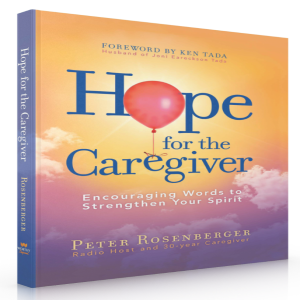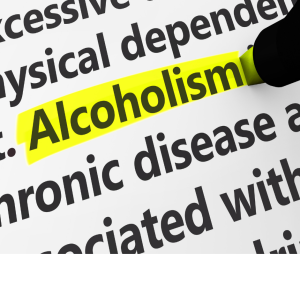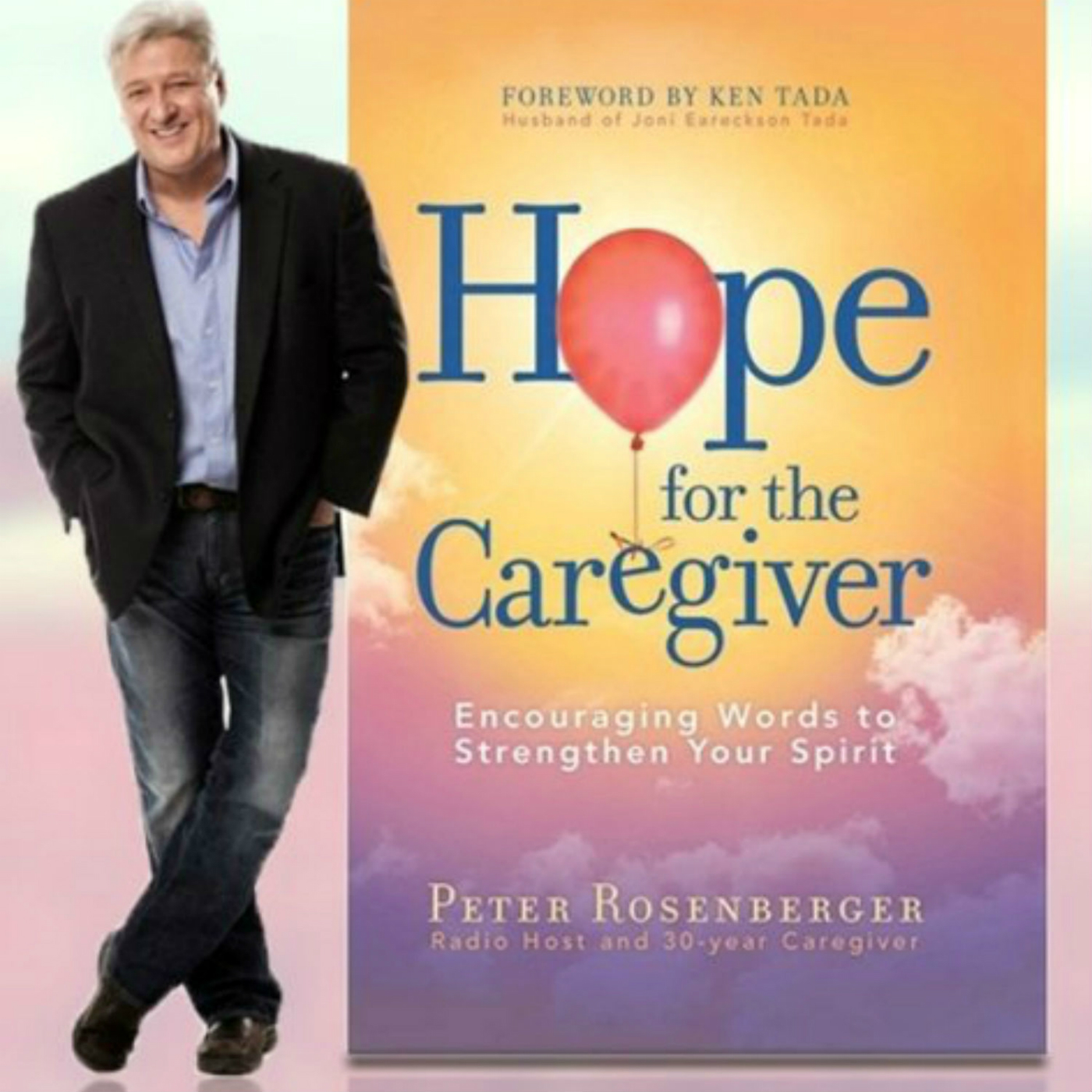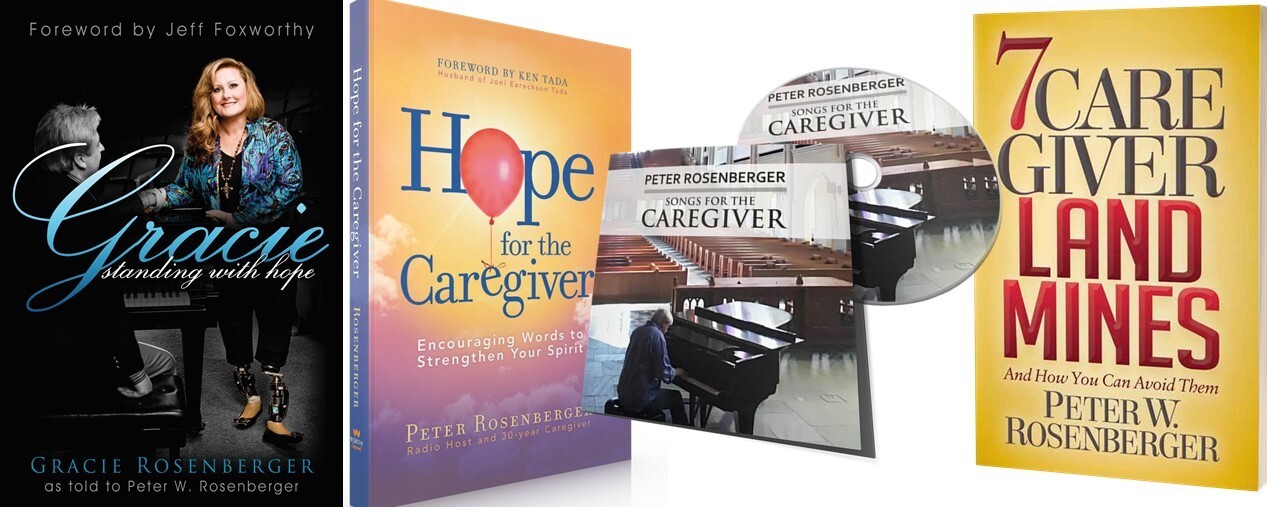Episodes

Sunday Nov 10, 2019
Sunday Nov 10, 2019
 You guys have a laid out a path for everybody else to follow. You have a laid out an example. And now God is using that to instruct His kids all over the country—all over the world—of, “’When you're up against a struggle,’ Don't turn in fear! —Watch what we do when we follow Christ." - Russ Taff.
You guys have a laid out a path for everybody else to follow. You have a laid out an example. And now God is using that to instruct His kids all over the country—all over the world—of, “’When you're up against a struggle,’ Don't turn in fear! —Watch what we do when we follow Christ." - Russ Taff.
The New CD From Standing With Hope Founder, Gracie Rosenberger


For virtually her entire life, Gracie Rosenberger’s powerful and soaring voice brought crowds to their feet— in stark contrast to her broken body traumatized by a horrific 1983 car accident that led to 80 surgeries and the amputation of both legs.
Yet, the lengthy years of surgeries, pain, infections, and a host of other issues took their toll. In 2010, Gracie’s already compromised health plummeted deeper, and she faced death several times.
The outlook looked bleak, and her voice appeared silenced.
Gracie, however, fought back. Above all, she trusted God with her difficult challenges. Literally singing from her hospital beds, Gracie pushed herself to rise from near certain death to stand …and walk.
With every step— and every song—Gracie trusts God with her challenges while demonstrating perseverance. Gracie continues to prove that she is…Resilient!
Joining me on the show, Gracie shared her powerful story, and the journey towards making this new CD ...her first in more than a decade. Gospel Music Icon, Russ Taff, called the show as they both shared about their duet on this album (The Joy of the Lord.)
This 14-song CD is an exclusive gift from Standing With Hope for a tax-deductible contribution of any amount.
About Standing With Hope
“For the Wounded and Those Who Care for Them”
Prosthetic Limb Outreach
Following the amputation of her legs, Gracie Rosenberger envisioned a way to assist her fellow amputees with quality prosthetic limbs as a means of sharing the Gospel of Jesus Christ. As a result, she launched Standing With Hope. This led to an unique partnership with the Republic of Ghana in 2005. Standing With Hope regularly sends supplies and teams to train and equip local worker to help them build and maintain limbs for their own people.
Inmate Outreach
In addition, inmates at a Tennessee prison volunteer to help disassemble used prosthetic limbs collected by Standing With Hope in order to recycle usable parts. This prison outreach is one of many faith-based initiatives run by Core Civic at their correctional facilities. As a result, those recycled parts are shipped (along with purchased supplies) to build custom-fitted limbs in Ghana. Furthermore, patients come from as far away as Nigeria to receive prosthetic limbs and treatment.
Family Caregiver Outreach
Standing With Hope expanded the ministry’s scope in 2011 to include an outreach headed by co-founder, Peter Rosenberger. Drawing upon his lengthy journey as Gracie’s caregiver, Peter launched his radio program, HOPE FOR THE CAREGIVER. As a result of Peter’s efforts and the great need of family caregivers, the show has soared to the #1 broadcast show for family caregivers. Hope for the Caregiver is heard LIVE each week on American Family Radio and Sirius XM’s Family Talk Channel (131).

Saturday Nov 09, 2019
Friendly Fire and the Family Caregiver
Saturday Nov 09, 2019
Saturday Nov 09, 2019
During one of our many visits to Walter Reed Army Medical Center to meet with wounded warriors, we met a bitter young soldier struggling with wounds he received from friendly fire. In a terrible mistake, he suffered injuries from his own country’s military.
As my wife, Gracie, walked over to greet him, he rudely snapped at her. Lying on his back while working out on a physical therapy table, he could only see Gracie from the waist up. This young man had no idea of her seventy plus operations, or the loss of both of her own legs. The physical therapist working with him looked embarrassed, and quickly tried to cover for Gracie by telling the young man that she was welcome there–and had a lot of practical advice worth hearing.
Disbelieving the therapist, he snarled back hatefully. Momentarily stunned, she regained her composure, and, while holding on to a railing, propped her right prosthetic leg near where his head rested on the low workout table.
He not only noticed her state-of-the-art metal leg beside him (encased in a beautiful shoe, I might add), but his eyes turned to watch her balancing on her other artificial leg, as well.
“You’re not the only amputee in here, big guy.” Gracie said, while looking him squarely in the eye.
The soldier in him quietly nodded at her, and he didn’t say anything else.
Ten feet away, I listened to a man who, although he lost both legs, cracked jokes with a contagious sense of humor. His face clouded over, however, when I pointedly asked him how things were back home.
Looking down at his new prosthetic legs, he whispered out, “My marriage is on the rocks, and it doesn’t look good.”
The loss of his legs didn’t keep him from joking, but the wounds of his heart silenced the laughter.
Friendly fire.
I asked another mother in the PT room if her son’s father had been up to the hospital. Looking over at her son’s newly amputated left leg, as well as the halo device holding the pins piercing his right leg, her jaw tightened as she flatly said, “He left years ago, and good riddance.”
Friendly fire.
How many of us deal with deep wounds caused by those closest to us? How many of us have caused damage to the ones we love and swore to protect? Sometimes “friendly fire” wounds are compounded with the shame of the wound itself—we feel our wounds come with dishonor, and our fists clench with a rage that wants to choke the one(s) who hurt us. Other times, we realize with horror how poorly we treated those counting on us, and the guilt and shame fill us with despair.
It’s easy to recall those things that cause hot tears to pour out of our eyes—the things driving us to lash out at the ones who hit us with “friendly fire.” In our pain, we might even strike at people who are simply trying to encourage us.
Gracie propped an artificial limb on a physical therapy table to help a hurting young man gain perspective and, hopefully, see that he can move past this horrific life-altering injury.
Christ is the wounded warrior who presents His own wounds, not only to communicate perspective, but also demonstrate His love for each of us. He didn’t just prop a metal leg on the table; He laid down His life and was Himself wounded—for our sins. His wounds made it possible for ours to be healed. He never clenched His fists, but rather stretched out his hands and received the nails.
When we look at our wounds, even those inflicted by our loved ones …or even self-inflicted, it’s all too easy to despair. But when we lift our eyes to look at HIS wounds, we are strengthened to know that HE redeemed our souls—and is redeeming our wounds.
He heals the brokenhearted and binds up their wounds. Psalm 147:3
Sponsored by STANDING WITH HOPE

Thursday Nov 07, 2019
Medicare for All Y'all?!
Thursday Nov 07, 2019
Thursday Nov 07, 2019
A lot of candidates running for President advocate "Medicare for All" as part of their platform. While Medicare itself is a decent program, I spend a little time discussing the realities of dealing with Medicare ...from a customer service standpoint.
Gracie and I both had to call Medicare for a significant issue. Getting bounced around from department to department, we logged over four hours on the phone one day, and another 90 minutes the next.
It's still not resolved as of this posting (with another 4 hours logged).
Imagine your best day at the DMV. That's what happens when government is the only game in town. You simply have no competition ...no incentive...to provide better service.
At some point in the customer service path, someone has to say, "We can build a better mousetrap!"
When listening to the candidates speaking, it sounds like overhearing a meeting in the teacher's lounge, "Here's what I think we ought to do ..."
It would be helpful for these candidates to share their own personal (and credible) experience in dealing with the healthcare system. Experience is always better than opinion.
Also on this episode, we played a new song from Gracie's upcoming CD titled Resilient. I also shared a few "Gracie-isms" and how Gracie nearly broke Amazon's Alexa ...at the source!!
In addition we shared our "Caregiver Tip of the Day," and of course, we also had my sidekick, The Count of Mighty Disco - John Butler!!!
A jammed pack show, demonstrating why Hope for the Caregiver is the #1 broadcast show for family caregivers!

Monday Nov 04, 2019
"Don't Pass the Snowplow!"
Monday Nov 04, 2019
Monday Nov 04, 2019
Yes ...I know it feels like the snowplow driver is listening to Lawrence Welk while we listen to Led Zepplin, but in winter weather, the safest place is often the place where you feel it's going maddeningly slow.
That also applies to our journey as caregivers.
We find that we must move at a pace we can't control...and, just like trying to pass a snowplow, we run the risk of getting hurt if we try to circumvent.
A friend once told me, "Families move at the speed of their slowest members." When serving as a caregiver the "pace car" dictates how fast we're going to go. We're going to get there ...when we get there. Beating on our steering wheel, swearing, and/or spazzing out isn't going to make it better or faster, but it will cause unnecessary tension ...that robs us of living a calmer, healthier, and even safer life.
- Sometimes, the snowplow is a chronic illness that progresses.
- Sometimes, it's a special needs child that moves at his/her pace.
- Sometimes it's someone with a addiction that struggles in their recovery program.
- Sometimes it's grief that takes whatever time it needs to process it out.
In my 30+ years, I've discovered the pace set for me is simply living in the moment ...one day at a time.
Therefore do not worry about tomorrow, for tomorrow will worry about its own things. Sufficient for the day is its own trouble. Matthew 6:34
Listen to the callers share their stories, as well. Also, of course, joining the show is himself ...my sidekick, John Butler (The Count of Mighty Disco)
"Don't pass the snowplow is our "Caregiver Tip of the Day" for this show. Hope for the Caregiver is LIVE on Sirius XM's Family Talk Channel (131) at 6PM Eastern.
Brought to you by:

Monday Oct 28, 2019
"Hello, my name is ...?" Caregivers and the loss of identity
Monday Oct 28, 2019
Monday Oct 28, 2019
 One of the hardest challenges for caregivers (and Landmine #4 from 7 Caregiver Landmines and How You Avoid Them), we address the loss of identity.
One of the hardest challenges for caregivers (and Landmine #4 from 7 Caregiver Landmines and How You Avoid Them), we address the loss of identity.
Many caregivers struggle to speak in first person singular when asked about their feelings, heart, and condition. One of the main reasons I do the show, is to help my fellow caregivers learn to rediscover (or possibly find) their own voices.
We also took calls, and dealt with some challenging issues. From drug addiction that traumatized a family to the transgender issue, we tackled topics from today headlines ...that our crippling families.
Sponsored by STANDING WITH HOPE

Thursday Oct 24, 2019
Mother Overwhelmed and Discouraged About Disabled, Alcoholic Daughter
Thursday Oct 24, 2019
Thursday Oct 24, 2019
Caller shared her discouraged about her daughter who suffered a stroke following an attack, and is now disabled ...but has also turned to alcohol.
It's difficult to watch loved one suffer. Watching them do so while addicted to alcohol and/or alcohol crushes the stoutest of caregiver hearts. This mother and I chatted for a bit on what her role is and isn't ...and what she can do and can't.
Sometimes, as caregivers, we must give firm boundaries ...but turn away to not show the hot tears that fill our eyes.
Yet, there is a path to safety for caregivers of addicts/alcoholics. We talked about it on this call.
Hope for the Caregiver is Brought to You By:
Standing With Hope

Wednesday Oct 23, 2019
Advice from Moses' Father-in-Law That Can Help With Landmine #7
Wednesday Oct 23, 2019
Wednesday Oct 23, 2019
Moses, yes ...THAT Moses ...had a smart father-in-law (Jethro) who pulled the prophet aside and gave him sound wisdom that can apply to family caregivers. In my book, 7 Caregiver Landmines and How You Can Avoid Them, Landmine #7 is "...thinking that it's all up to you!"
Read what Jethro told Moses.
"Moses' father-in-law said to him, “What you are doing is not good. You and the people with you will certainly wear yourselves out, for the thing is too heavy for you. You are not able to do it alone." Exodus 18:17-18
This theme, plus calls rounds out our 10/19/2019 show.
Brought to you by Standing With Hope





